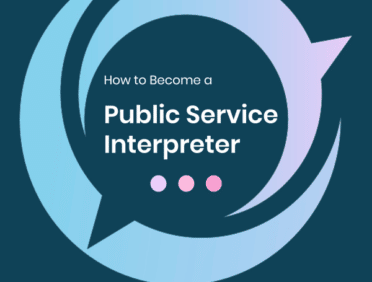Who can become an interpreter for the NHS?
Interpreting is a very accessible career. Anyone who speaks English plus at least one other language could become an NHS interpreter, provided they are willing to develop essential interpreting skills and knowledge.
An interpreter facilitates a conversation between two or more people who speak different languages. These are known as the source language (the language the original communication is in) and the target language (the language the communication is being interpreted into).
The interpreter’s role is to interpret the exact meaning of the original communication as closely as possible, without adding or omitting any information or changing the original message. This includes more than just the words used. A skilled interpreter will also mirror the tone of voice used in the original communication, including aspects such as humour, sarcasm, emotion and similar.
Put simply, the process of interpreting is:
● Understand the word or phrase in the source language
● Have a deep understanding of the meaning behind the word or phrase
● Find an equivalent in the target language
● Explain the concept of the source word or phrase in the target language.
Interpreters perform a vital and rewarding role, but it is a role that exposes interpreters to vulnerable people and situations. If something is interpreted wrongly, or incorrectly, the consequences can be literally life threatening. This means that to practice professionally, interpreters must be qualified.
Step 1: Qualifications
Step 1 is to become qualified.
There are several qualifications, but there is one main qualification that is needed to achieve the aim of becoming an NHS interpreter – the Level 3 Certificate in Community Interpreting. This is the level that allows you to become a paid interpreter and it has several major advantages:
Level 3 Certificate in Community Interpreting
This is the true entry level to paid interpreting and many professional interpreters have started their careers with this qualification.
The Level 3 Certificate in Community Interpreting is suitable for paid work. Mainly public service work in areas including health, mental health, social services, welfare benefits, some immigration, education, housing, local government and even a small amount of low-level legal work. With a Level 3, interpreting clients understand the holder will deliver a professional service and that their competence has been assessed.
If you have never done any interpreting qualification before, it is ideal for starting out. You will not find it too difficult if you have not already got any interpreting experience.
One benefit to this qualification is that it starts from ground zero. A good Level 3, like the Learn Q qualification, teaches you everything you need to know from what an interpreter is, what they do and where they work, all the way up to how to prepare for assignments. It should include an in-depth look at the skills and the abilities you need to master not only to pass the assessments, but also to have a successful paid interpreting career.
Most Level 3 interpreting courses require you to write a lot of written essays, plus pass a practical exam. However, The Learn Q Level 3 Certificate in Community Interpreting is an exam only qualification, which means you do not need to write any essays, you simply need to pass the practical exam. The practical exam assesses two-way (consecutive) interpreting skills via role play, plus a sight translation from English.
The average time for completion varies depending on who you take the qualification with, but the Learn Q Level 3 Certificate takes an average of 12 weeks, which involves 60 – 80 hours study, including practice and exam revision.
Step 2: Prerequisite Requirement
A great advantage of the Level 3 Certificate in Community Interpreting is that you do not need to have passed Interpreting Levels 1 or 2 to be accepted onto the qualification. You need to competently speak two languages, including English, plus you also need to be able to read English.
In terms of English, the level should be B2 or above:
In everyday speech, this level might be called “confident”, as in “I am a confident English speaker”. The official level descriptor is “upper intermediate”. At this level, students can function independently in a variety of academic and professional environments in English, although with a limited range of nuance and precision.
If you are unsure, you can test your English here for free : https://www.efset.org/quick-check/take-test
There can be a lot of flux in demand for interpreting languages over time. It can often depend on factors including:
● How commonly spoken a language is in the country or in a particular region
● Migration trends
● Current events
● The current number of interpreters available in a particular language
For instance, when Russia invaded Ukraine in 2022, a large number of people migrated to the UK from Ukraine. This meant that there was suddenly a large increase in the number of people who spoke Ukrainian in the UK, and there weren’t enough qualified Ukrainian interpreters to cover the need, so the language was in demand.
Generally though, the requirement for interpreters stays relatively stable, with trends emerging over time but some languages are consistently in demand and are closely linked to the numbers of the UK population who speak a particular language. At the time of writing this blog, the most popular interpreting languages in the UK were:
- Polish
- Punjabi
- Urdu
- Bengali
- Gujarati
- Romanian
- Arabic
- Chinese (Mandarin and Cantonese)
- Portuguese
- Spanish
Step 4: Skills and Knowledge
Broadly speaking there are 3 main areas of skill and knowledge that interpreters must be proficient in: language, subject matter, and interpreting skills.
Language
Interpreters need to be highly skilled in language first and foremost. Interpreters need to be fluent in both languages that they will be interpreting from and into so that they can accurately render what is being said with no loss of meaning. They are expected to be able to:
- interpret the meaning of the communication in both languages
- Interpret everything that is said accurately without adding anything to the message, or leaving anything out
- Interpret fluently with the correct sentence structure
- switch confidently between both languages, and
- Convey meaning even if there is no direct equivalent in the target language
At level 3, interpreters need to be able to speak both languages and read in English.
Subject matter
Even when somebody is fluent in a language, they are unlikely to know all the specialist terminology that an interpreter needs to use in their daily assignments. This means that interpreters must revise subject specialist vocabulary and build up glossaries to help them with their assignments. Interpreters are expected to be:
- familiar with the subject matter, environment and roles of the setting
- knowledgeable about the cultural differences between the conversation participants
- able to render complex language, specialist terminology and jargon between languages
Interpreting skills
Professional interpreters have a number of guidelines that they are expected to follow in terms of interpreting skills, and these skills are designed to ensure the interpreting provision is risk free for all participants. Essential interpreting skills include:
- explaining the interpreter role so participants know what to expect
- facilitating effective conversation
- using the correct type of interpreting
- following the interpreter code of conduct
- being clear, audible and understandable throughout
- ask questions and check meaning when needed, and
- accurately reflect the register, tone, intonation, speed plus any intention, attitude, irony, sarcasm or innuendo of the original message
A competent interpreting course will explain all the above in more detail.
Step 5: Training and Up-skilling
The best way to train how to be an interpreter is to book a Level 3 Certificate in Community Interpreting preparation course.
This will teach students what an interpreter is, what the interpreter role involves and how to work as an interpreter in public services and a good course will prepare interpreters not only to pass their Level 3 exam, but also to be a competent, professional interpreter throughout their career.
Typical content should include:
- How to prepare for interpreting assignments
- How to prepare to work in public service interpreter in Level 3 settings (health, welfare, social services, housing, education, local government) including building glossaries
- Interpreting skills and techniques
- How to interpret two-way / consecutively
- How to perform a sight translation
- Continuing Professional Development (CPD) for Interpreters
Most Level 3 Interpreting courses will have a requirement for students to complete several essays (usually around 7) which need to be completed to an accepted level before they can complete their qualification and receive their certificate. Completing these essays can take a large amount of time and effort and inevitably slow students down on their path to becoming certified.
The Learn Q Level 3 Certificate in Community Interpreting does not have any requirement for essays, meaning it is more straightforward and more time effective to complete.
Because interpreting is a practical vocation, to be successful it is essential that any student takes the time to practice the act of interpreting at all opportunities. Practicing with partners (including other students, friends and family members) is extremely useful, as is practicing interpreting medical or NHS based TV programmes, radio and any other kind of audio. Writing scenarios and reading them aloud is useful, as is recording segments of these scenarios and playing them back, interpreting what is said in one language into another.
Another way to practice would be to book time with a tutor who speaks the same language combination, and who are themselves experienced NHS interpreters.
Step 6: Certification
The only real certification that an interpreter requires is the qualification so if you have studied a Level 3 Certificate in Community Interpreting and received your certificate for successfully passing the exam you can use this to apply for interpreting jobs.
At Level 3 you do not currently have to pass an exam for every language combination that you wish to interpret. This means, if you speak English plus two or more languages fluently and wish to work as an interpreter in multiple language combinations you do not need to take multiple exams and achieve a certificate for each language that you wish to work in.
Step 7: Daily Roles and Responsibilities
The Majority of interpreters work as freelancers, meaning they are responsible for finding work, ensuring assignments are completed professionally and on time, and for continually developing their own professional practice.
The daily tasks an interpreter is likely to complete will typically involve:
- checking their diary to make sure they are aware in advance what interpreting assignments need to be fulfilled and the location where they need to be fulfilled.
- making travel plans for any face-to-face assignments to ensure they arrive at all assignments on time
- completing any pre-booked interpreting assignments
- adhering to the interpreter code of conduct
- keeping any interpreting agencies, they work with informed have any information they need to know
- logging on to take telephone interpreting or video remote interpreting calls where they do not have pre booked assignments
- using technology such as websites and smartphones to accept additional job opportunities that arise
- making a note of any terminology that they come across during an assignment that was unfamiliar to them and researching the terminology so they have a full understanding of it and this interpretation the next time it should come up
- completing CPD activities so that they continually develop their skills and knowledge
Step 8: Career Path and Progression
Holding a Level 3 Certificate in Community Interpreting gives you access to thousands of potential interpreting assignments and is a level that many interpreters will never progress from as it is often sufficient to build a satisfying and long lasting career. In addition to NHS interpreting, the Level 3 Certificate in Community Interpreting allows holders to work in specialisms including:
For those who wish to access additional opportunities, legal interpreting is the next logical step as that allows access to additional specialisms including:
- Police (law enforcement)
- Courts
- Prison / probation
- Immigration / Home Office
The level of interpreting qualification needed to access this work is the Level 6 Diploma in Public Service Interpreting, which is also known as the DPSI. This qualification is very difficult (equivalent to a degree) and should not be attempted by anyone that does not already have at least a Level 3 Certificate in Community Interpreting and/or around 2000 hours of paid interpreting experience. The original Level 6 Diploma in Public Service Interpreting was originally created by the Chartered Institute of Linguists (CIOL) (www.ciol.org.uk) and is one of the most established and respected interpreting qualifications available and suitable for advanced and experienced interpreters.
The DPSI includes similar content to the Level 3, plus the legal specialism and additional interpreting skills for simultaneous interpreting, sight translation into English and draft written translation to and from English.
Some courses will accept those who can speak, read, and write two languages, including English, at an advanced level. However, some will only allow entry if you have a Level 3 interpreting qualification or higher due to the high failure rates. There are online and offline courses and exams available.
The original and most recognised DPSI exam, run by the Chartered Institute of Linguists (CIOL), is a practical test which tests candidates on two-way (consecutive) interpreting, (whispered) simultaneous interpreting, sight translation to and from English and (draft) written translation to and from English. You also need a thorough knowledge of the legal specialisms that will be tested so on average a DPSI qualification will take around 12 months to acquire and involve anything from 220-400 hours work, including practice and revision.
Learn Q offer a 100% online Level 6 Diploma in Public Service Interpreting preparation course, which is designed to help you prepare for the CIOL DPSI exam. The cost varies depending on how many hours of private tuition you want to sign up for. You can choose self-study only, but you can also choose 5 or 10 hours of tuition. Private tuition is strongly recommended.
There are a number of other providers offering DPSI or other Level 6 qualifications (including some universities) but none are yet as well recognised as the original, CIOL version.
Experienced interpreters who often hold a DPSI can also work in commercial settings, in politics, for celebrities and even the United Nations (UN), although in reality, very few professional interpreters get to work with the UN. Those that do are often highly qualified, with a minimum Level 6 Diploma in Public Service Interpreting (DPSI) or equivalent (such as a university degree which includes an interpreting specialism), are fluent in a minimum of 3 languages and highly experienced. This means if you wish to become a UN interpreter you will need to work very hard.
Although it is tough, it is not an impossible dream, which may be achieved within 5-10 years of starting out.
Step 9: Practicing and Keeping Up to date
Interpreting is an isolated profession, and therefore much CPD and practicing is done by the interpreter themselves.
In some circles, when CPD is mentioned, people assume it is all about becoming trained, attending courses, and learning more in this way. However, this is not entirely true. Attending training courses is certainly one of the ways that you can do CPD, and the International School of Linguists (ISL) provides a subscription based CPD membership which allows interpreters to complete regular CPD online as well as attending events. However, anything that can help you improve your skills or knowledge is classed as CPD. This could be reading some useful materials, watching videos, practicing speaking aloud in front of a mirror, practicing your interpreting with family or friends (but not in a real-life situation), listening to podcasts about interpreting, attending webinars, creating, or revising glossaries, researching on the Internet, working on your paraphrasing or sight translation, reading interpreting or language blogs, watching a relevant video and more.
Even watching a TV programme can be considered CPD if it is something which will help you understand more about your professional practice or your specialisms (e.g., medical or benefits). Generally, it would mean that you are not passively watching them for entertainment but focusing and thinking about how they can apply to the work you do (or even if you are using them to practice interpreting what is said by the actors).
There are also many specific videos on YouTube (www.youtube.com) and other sources that you can watch to improve your development, by practicing your public speaking in front of a mirror. Remember, anything you do that is related to developing yourself as a professional can be classed as CPD.
You do not have to spend hours at a time doing CPD. You can just complete a few minutes when you have some spare time, provided you make sure that you complete CPD regularly, the tasks you undertake are useful, and you are efficient. Conversely, spending hours doing something that is not really going to help you, like revising obscure terms that will rarely or never come up in a conversation between a doctor and a patient is not an effective use of your time. Focus on the reason why you are doing specific CPD activities, what they will help you improve and how, and the time spent will be much more productive. This is known as ‘structured’ CPD. It can be the most useful type of CPD, i.e., thinking about the outcome you want beforehand so you can measure your success.
Step 10: NHS Interpreting Opportunities
If you want to make money from interpreting, one of the simplest routes is to search for and register for language service providers. Language service providers (LSPs) are essentially interpreting agencies which, essentially, connect clients who need interpreters with an interpreter.
Normally, an LSP will have a ‘pool’ of registered interpreters working with them in multiple languages. When a client needs to request an interpreter, e.g., a hospital, they will get in touch with the LSP, the LSP will send the job out to interpreters with the appropriate language combination registered with them and then they will book one of those interpreters.
LSPs hold many of the major interpreting contracts now, so in many cases with public services the only way to really pick up work with these services is through LSPs. This includes hospitals, the Department of Work and Pension or Job Centres, Social Services, immigration, housing, the Ministry of Justice (courts, prison/probation), the Police and charities.
To find work, the easiest way is to search for LSPs. In the UK there are plenty of LSPs across the country. You may also be able to work as a telephone interpreter in the US as well, so it is sometimes worth searching for telephone interpreting agencies, or over the phone interpreting, as it is called in the US.
In addition to search engines, you can also find companies on LinkedIn and follow their LinkedIn page, or you can follow companies or groups on Facebook. Often job adverts are posted to LinkedIn and Facebook, and these can come up in your ‘feed’.
Once you have searched for language service providers you will need to apply to join them. You can do this by responding to adverts on LinkedIn and Facebook, and elsewhere on the Internet. If you search for ‘interpreting jobs,’ you may find opportunities on job boards. Of course, you can also apply to a language service provider directly. Usually if they have an Internet presence there will be an online application process. If not, there are usually instructions about how to apply. Alternatively, you could email them directly with a copy of your CV and relevant qualifications and ask to apply that way. If an LSP is particularly busy, you may not hear back straight away from any online or email application, so it can be quicker to phone them up directly, find out if they have requirements for interpreters in your language and start the application process.
One question interpreters often ask is how many LSPs they should apply to. If you are a freelance interpreter, there is no limit to the number of LSPs you can apply to. Normally, they would not have exclusivity terms in their contract. For example, one LSP would not stop you working for another if you are registered with them, unless you were on a full-time contract (but these types of contracts are rare for interpreters).
The best advice when you are starting out is to keep persevering. At first it may feel as if you are not getting anywhere, but if you persevere you will often find success, so the key is to keep going. Initially, I advise you to apply to ten or more language service providers, for two reasons:
The more language service providers you are registered with, the better your chances of finding work. Different language service providers hold contracts with different clients, which means they have differing requirements for languages.
The more LSPs you are registered with, the more chance you have of building up a positive reputation with those LSPs. Accepting the jobs (assignments), making sure that you do not let the LSP or client down, always being on time and not cancelling assignments can help to build up a positive reputation for yourself and lead to more opportunities. (If you find you have two or three language service providers that you get many assignments from, you enjoy working for them and they enjoy working with you, you may consider letting other LSPs know that you are not available for work at that time. This means you will not be constantly turning down assignments and risking a poor reputation).
When you register with an LSP, they will ask you for several things:
Qualifications: As in step 1, this will include interpreting qualifications such as Level 3 Certificate in Community Interpreting or Level 6 DPSI. It may also include other relevant qualifications. For example, a qualification in translation, or a qualification that has a language link in some way. It depends on the language service provider, the kind of contract they have and the requirements that their clients have.
- Experience (this isn’t always needed, and the number of hours needed will vary)
- Proof of ID and/or Right to Work: LSPs will often ask for a passport. These might need to be endorsed to show you can stay in the UK and you have the right to work in the UK. Depending on where you are from originally, you could also include national identity cards, biometric ID, or immigration documents. Often, they will ask for the original documents to be sent to them. If you are sending original documents, make sure you send them by Recorded Delivery, so they are tracked, so they do not get lost. The LSP will generally take the originals, verify them, make copies, and then send them back to you.
- DBS or basic disclosure check: A basic DBS check is a criminal record check that you can request for yourself, but LSPs may reimburse you depending on who they are, what their policy is and which languages you speak.
- An up-to-date CV: which they will store for their records.
Once you have registered, the LSP will start to include you on job offers, including the NHS, and you are on your way!
Good luck!
To download a .pdf of this blog, please click here












